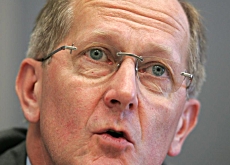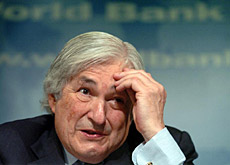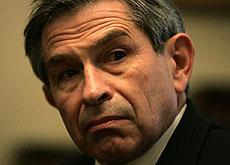Deiss says new World Bank boss is “quite open”

Swiss Economics Minister Joseph Deiss says he has a good impression of the controversial new president of the World Bank, Paul Wolfowitz of the United States.
Deiss met Wolfowitz for half an hour on Saturday. The current number two at the Pentagon will begin his new job at the World Bank on June 1.
Although very controversial for his role as the architect of the war in Iraq and accusations that he scorns multilateralism, Wolfowitz made a good impression.
“I think that Paul Wolfowitz is quite open and has decided to go in the direction that we feel important,” Deiss told swissinfo at the end of the talks.
Deiss told Wolfowitz that Switzerland wanted his five-year tenure at the head of the world’s main development organisation to put emphasis on what he called “central issues”.
Transparency
These include continuity of the policies of the outgoing World Bank head, James Wolfensohn, decentralisation of the work of World Bank officials in the field in developing countries, transparency concerning “the importance and efficiency of public aid” to poor countries and more cooperation with non-governmental organisations (NGOs).
Critics of Wolfowitz fear that under his leadership the World Bank will become a part of US foreign policy.
Deiss stressed to Wolfowitz the importance that Switzerland attached to the World Bank remaining a truly multilateral institution.
“It was important for me to receive an assurance of his commitment for the aims of the World Bank as a multilateral organisation which works in the interests of all member countries, whether beneficiaries or providers of funds,” Deiss commented.
He added that he had received sufficient assurances on all issues from Wolfowitz.
Fan of Switzerland
“I found that he had the necessary frankness for cooperation to be built up,” said Deiss, adding that the right-hand man of US defence minister Donald Rumsfeld was a fan of Switzerland.
“He proved he knew our country very well, to such an extent that he could cite an inscription in Romansh which is on the front of a building in one of our villages [Mathon in canton Graubünden].”
“It is an inscription which says that respect for God is the beginning of wisdom,” he added.
The most difficult issue that Wolfowitz will have to deal with, together with the managing director of the IMF, Rodrigo Rato, is the cancelling of debt of the poorest countries.
The subject again dominated discussions at the World Bank and IMF meetings but as in previous talks no decision was taken.
No consensus
“There is no consensus, neither on the countries which should benefit from a reduction of their debt, nor on the means to finance it,” commented Swiss Finance Minister Hans-Rudolf Merz, who is accompanying Deiss.
Switzerland joined the US in opposing the British idea of financing the cancelling of debt by selling IMF gold reserves.
“We should not weaken the IMF’s financial position in any way,” Merz commented.
The Swiss delegation also gave lukewarm support to a suggestion from France and Germany to impose a tax on kerosene or plane tickets to finance the cancelling of debt of the poorest countries – a tax that is, however, considered feasible by the World Bank and the European Commission.
Deiss said Switzerland was “interested” by the idea of such a tax but Merz stressed that “things are not really ready when it comes to a tax on kerosene”.
swissinfo, Marie-Christine Bonzom in Washington
The spring meetings of the International Monetary Fund (IMF) and the World Bank are taking place this weekend in Washington.
Finance Minister Hans-Rudolf Merz and Economics Minister Joseph Deiss lead the Swiss delegation.
The president of the Swiss National Bank, Jean-Pierre Roth, is also attending.
The managing director of the IMF, Rodrigo Rato warned on Saturday of the risk of an “abrupt correction” of financial markets if imbalances in the world economy were not resolved.
Among the imbalances cited by Rato were the US budget and trade deficits, the wide differences in growth in the world’s largest economic regions, and the large variations of interest rates around the world.

In compliance with the JTI standards
More: SWI swissinfo.ch certified by the Journalism Trust Initiative


You can find an overview of ongoing debates with our journalists here. Please join us!
If you want to start a conversation about a topic raised in this article or want to report factual errors, email us at english@swissinfo.ch.